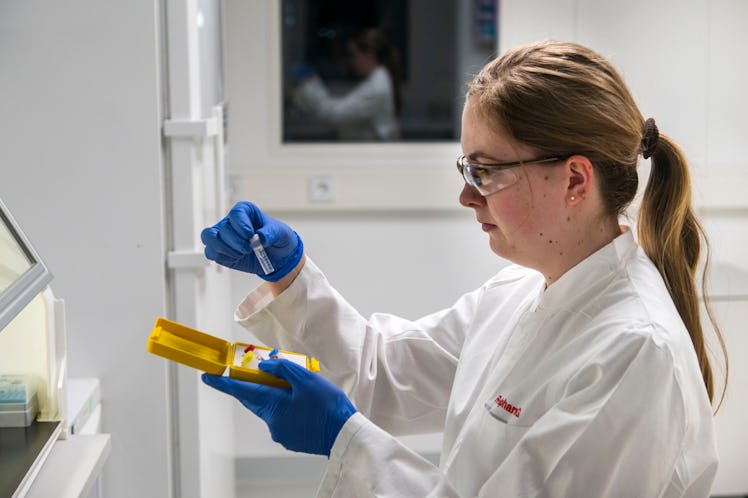
Here's What We Know About How Long Coronavirus Is Contagious
With over 460,000 confirmed coronavirus cases in the United States alone as of April 10, elected officials have doubled down on social distancing and stay-at-home measures. But even as different states work to flatten the curve and limit the virus' spread, the growing number of confirmed cases has given Americans a significant cause for concern. If you or someone in your community has contracted the virus, you might be wondering — how long is the coronavirus contagious? Like many questions, this one is still unclear.
Dr. Faheem Younus, the chief quality officer for the University of Maryland Upper Chesapeake Health, tells Elite Daily that with the limited knowledge public health experts currently have, "two to 14 days is the best estimate we have for an incubation period." Then, once it becomes clear that someone does have the coronavirus, hospitals are making recommendations about when patients can say with some confidence that they have fully recovered.
The best guidance available is that if a previously sick person is symptom-free for 72 hours, that person is probably not contagious anymore. "That has been true for influenza or H1N1 or even for SARS, which was another coronavirus," says Younus. "So we believe that once the patient recovers and they are symptom-free without any medications, without any [fever reducers] for 72 hours, that their degree of contagiousness, infectivity should be minuscule to none." It's important to highlight that if your symptoms have disappeared because you've been taking medicine, like Tylenol or a cough suppressant, that doesn't count. It has to be 72 hours without the meds.
Ideally, everyone who tests positive for the virus could be tested again once they're symptom-free, but health care providers don't necessarily have the resources for that. Because there has been a shortage in tests and delays in testing results, Younus says that hospitals are prioritizing testing for people who will have to return to high-risk environments, such as health care workers or nursing home residents.
"If this is a health care worker who was positive and will now have to go back to a hospital setting, we would like to test that person to make sure we’re not putting our patients at risk," Younus explains. "If this is someone who ... works at home and got this infection in Italy and now is at home, we would not do a second test on that person. We would like to save that test, and just being symptom-free for 72 hours would be good enough." According to Younus, most coronavirus patients have recovered within 10 to 14 days from when they first fall sick, though there have been cases where patients are sick for a lot longer than that — and there isn't enough information out there yet to know why that might be.
Naturally, this has resulted in uncertainty in patients who have tested positive for the coronavirus and have since recovered. But the fact of the matter, Younus says, is that due to the newness of this virus, even the experts don't have all the answers yet. Younus says that scientific understanding about the coronavirus is "evolving by the day" as data about the virus continues to emerge from different countries. A sizable chunk of data comes from studies conducted in labs, which doesn't account for all of the factors that could impact coronavirus transmission a real-world setting.
Still, there are some things we can know. According to the Centers for Disease Control and Prevention (CDC), the coronavirus is believed to be primarily transmitted through respiratory droplets, which are generated whenever you breathe, talk, cough, or sneeze. That means that people who have the coronavirus but don't have symptoms, or have mild symptoms, can still transmit the virus to others. However, Younus says, people with severe symptoms are probably more likely to transmit the virus than those who are asymptomatic because they are propelling more viral particles into their environment. Practices like social distancing and excellent hand hygiene can likely go a long way toward protecting yourself from contracting the virus, or avoiding transmitting it to others.
Ultimately, Younus says, the only thing you can control is your own behavior. If you follow CDC guidelines by limiting non-essential outings, staying home when sick, practicing social distancing, and regularly washing your hands with soap and water, you will have taken some very important steps toward protecting yourself and your household or community. It's not helpful to "go from one extreme of denial to the other extreme of panic" when talking about the coronavirus, Younus says. Instead, "we must remain in the middle, that beautiful place called preparedness."
If you think you’re showing symptoms of coronavirus, which include fever, shortness of breath, and cough, call your doctor before going to get tested. If you’re anxious about the virus’s spread in your community, visit the CDC for up-to-date information and resources, or seek out mental health support. You can find all Elite Daily's coverage of coronavirus here.
Experts cited:
Dr. Faheem Younus, Chief Quality Officer for University of Maryland Upper Chesapeake Health